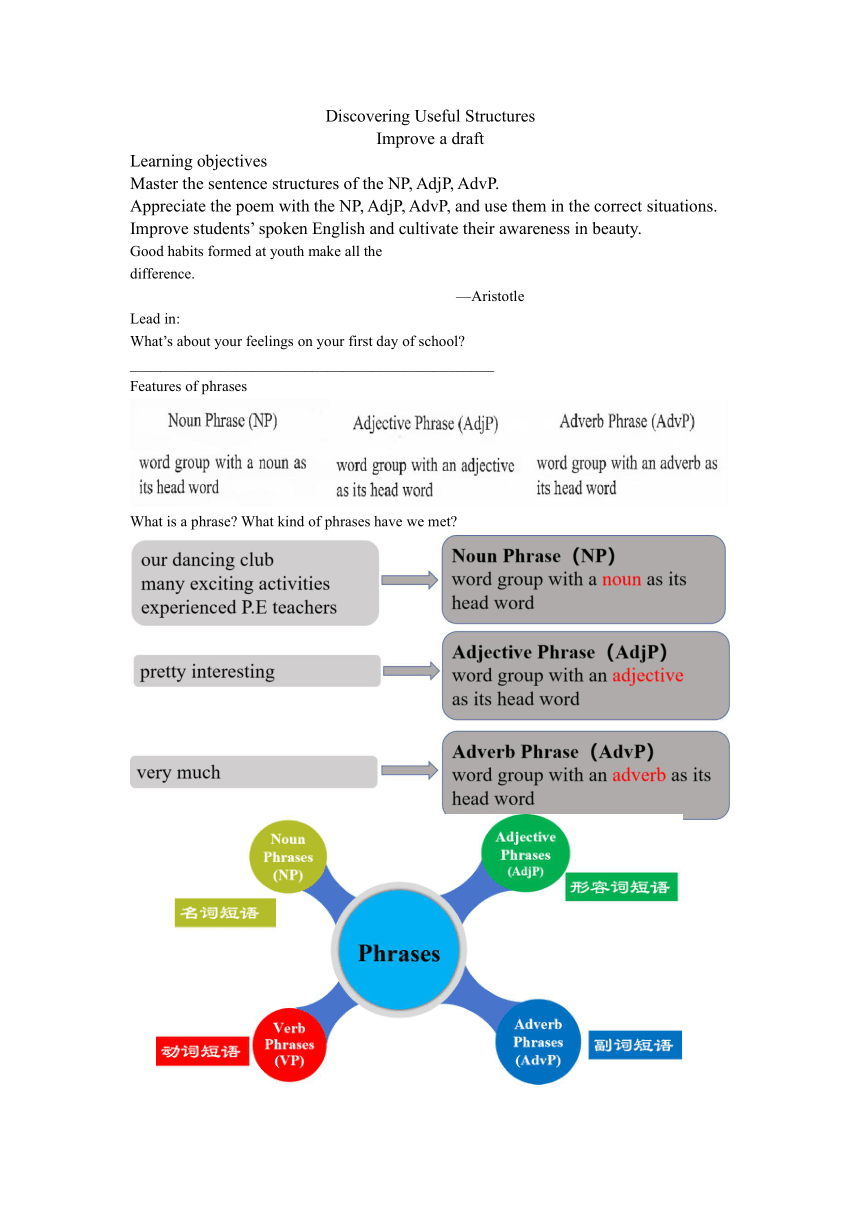人教版(2019)必修 第一册Welcome unit Discovering Useful Structures 导学案(无答案)
文档属性
| 名称 | 人教版(2019)必修 第一册Welcome unit Discovering Useful Structures 导学案(无答案) |

|
|
| 格式 | docx | ||
| 文件大小 | 211.3KB | ||
| 资源类型 | 教案 | ||
| 版本资源 | 人教版(2019) | ||
| 科目 | 英语 | ||
| 更新时间 | 2024-04-04 00:00:00 | ||
图片预览

文档简介
Discovering Useful Structures
Improve a draft
Learning objectives
Master the sentence structures of the NP, AdjP, AdvP.
Appreciate the poem with the NP, AdjP, AdvP, and use them in the correct situations.
Improve students’ spoken English and cultivate their awareness in beauty.
Good habits formed at youth make all the
difference.
—Aristotle
Lead in:
What’s about your feelings on your first day of school
________________________________________________
Features of phrases
What is a phrase What kind of phrases have we met
1. Obviously, I was unhappy, but I won’t quit. (P14)
More / Less / Not importantly, he will pay a visit to China in 5 days.
All of a sudden, it rained cats and dogs.
suddenly, finally, occasionally, luckily, happily, naturally, generally, actually, definitely, apparently, undoubtedly 等句子副词或短语(by accident / in consequence / in particular / as usual)可以作为插入成分,修饰整个句子。
1). 幸运的是,我当时没在现场。(on the spot)
2). 更重要的是,他没有收下礼物,还狠狠地批评了送礼的人。
3). 结果,他受到了很大的损失。
2. I'll find a way to improve on my own so that I can make the team next year.(P14)
(1)so that引导目的状语从句时,从句常和情态动词may/might, can/could, should, would等连用。
(2)in order that也可以引导目的状语从句,相当于so that,但是更正式,可以用“in order to+动词原形”替换。
(3)so that还可以引导结果状语从句,意为“因此,所以”,主从句之间可用逗号隔开。
1). 我们应当多读书以便可以获得更多的知识。
2). 他讲得很清楚,所以大家都听懂了。
3). They got up early so that they could catch the first bus.
→They got up early ____________ they could catch the first bus.
→They got up early ____________ catch the first bus.
3. I know I’ll have to study harder as a senior high school student and get used to being responsible for a lot more. (P14)
He used to be a teacher, but now works as a professional novelist.
Wood is used to make paper, which is a big waste of resource.
4. But I’ll be well prepared for university or whatever else comes in the future. (P14)
no matter what 引导让步状语从句,whatever 既能引导让步状语从句,也能引导名词性从句。
即学即练
1. Find the noun / adjective / adverb phrases in the passage and state their functions. (P20-2)
If you have learnt some maths at school, you can quite quickly work out that one eleventh is about 9 percent. But did you know that 9 percent is also the number of children who are not at school That’s right — one in 11 children is not studying and probably even cannot do the simple maths you just did so very easily. They drop out of school because their families are too poor and they have to work like adults. In 2013, millions of children and teenagers were out of school.
Improve a draft
Learning objectives
Master the sentence structures of the NP, AdjP, AdvP.
Appreciate the poem with the NP, AdjP, AdvP, and use them in the correct situations.
Improve students’ spoken English and cultivate their awareness in beauty.
Good habits formed at youth make all the
difference.
—Aristotle
Lead in:
What’s about your feelings on your first day of school
________________________________________________
Features of phrases
What is a phrase What kind of phrases have we met
1. Obviously, I was unhappy, but I won’t quit. (P14)
More / Less / Not importantly, he will pay a visit to China in 5 days.
All of a sudden, it rained cats and dogs.
suddenly, finally, occasionally, luckily, happily, naturally, generally, actually, definitely, apparently, undoubtedly 等句子副词或短语(by accident / in consequence / in particular / as usual)可以作为插入成分,修饰整个句子。
1). 幸运的是,我当时没在现场。(on the spot)
2). 更重要的是,他没有收下礼物,还狠狠地批评了送礼的人。
3). 结果,他受到了很大的损失。
2. I'll find a way to improve on my own so that I can make the team next year.(P14)
(1)so that引导目的状语从句时,从句常和情态动词may/might, can/could, should, would等连用。
(2)in order that也可以引导目的状语从句,相当于so that,但是更正式,可以用“in order to+动词原形”替换。
(3)so that还可以引导结果状语从句,意为“因此,所以”,主从句之间可用逗号隔开。
1). 我们应当多读书以便可以获得更多的知识。
2). 他讲得很清楚,所以大家都听懂了。
3). They got up early so that they could catch the first bus.
→They got up early ____________ they could catch the first bus.
→They got up early ____________ catch the first bus.
3. I know I’ll have to study harder as a senior high school student and get used to being responsible for a lot more. (P14)
He used to be a teacher, but now works as a professional novelist.
Wood is used to make paper, which is a big waste of resource.
4. But I’ll be well prepared for university or whatever else comes in the future. (P14)
no matter what 引导让步状语从句,whatever 既能引导让步状语从句,也能引导名词性从句。
即学即练
1. Find the noun / adjective / adverb phrases in the passage and state their functions. (P20-2)
If you have learnt some maths at school, you can quite quickly work out that one eleventh is about 9 percent. But did you know that 9 percent is also the number of children who are not at school That’s right — one in 11 children is not studying and probably even cannot do the simple maths you just did so very easily. They drop out of school because their families are too poor and they have to work like adults. In 2013, millions of children and teenagers were out of school.
